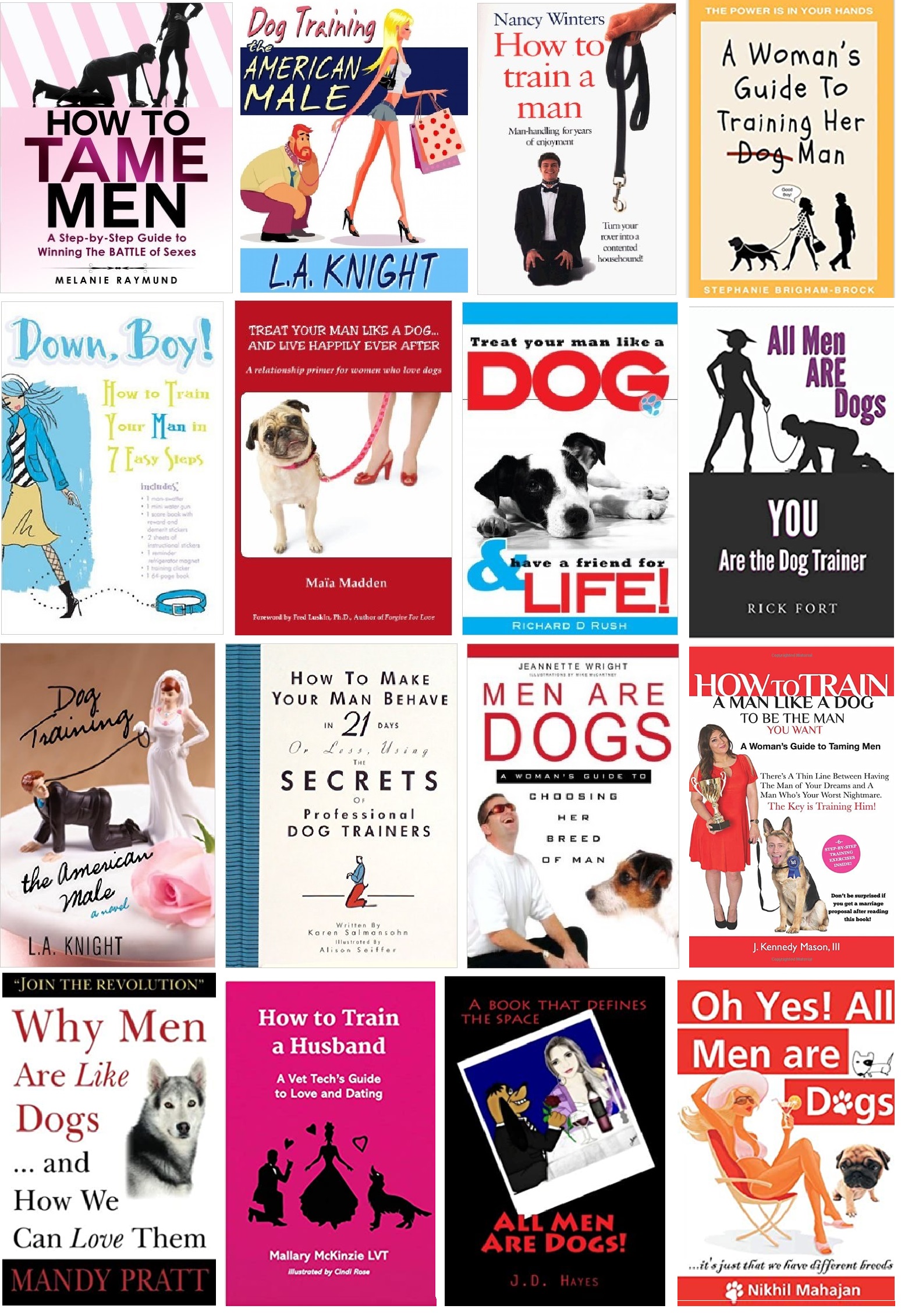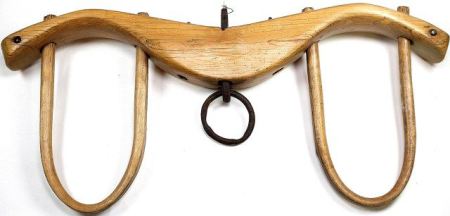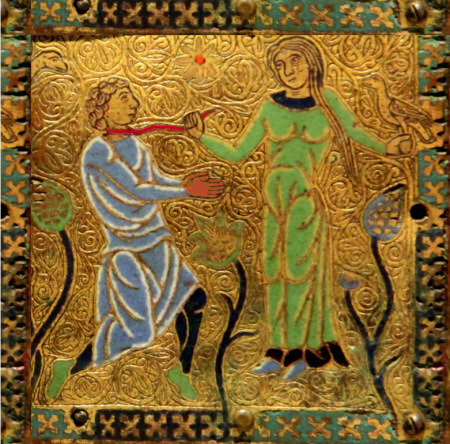
Horses, dogs and men have one thing in common; they need training in order to shed their wild ways and become civilized. They need to be taught when to walk, run, sit, shit, play, work and, of course, when to cease fighting and attempting rape.
Women will do this for them.
From the pony club to the dog obedience class, and all the way through to wedding and relationship-advice magazines teaching “How to get him to do xyz,” – women dominate the field of animal training.
Starting in childhood, girls are educated in the Pavlovian school of human interactions, learning sexual manipulation, shaming and relational aggression as powerful techniques that if properly applied will help transform men, and even the baddest of badboys, into proverbial Good Men.™ Is it any wonder then that when a woman sees a badboy she sees a creature with ‘train me’ written across his forehead, a task for which her whole life has been but a preparation….. a lady won’t tolerate a feral animal wandering through the gynosphere, especially a handsome one, when she has the wherewithal to civilize him.
Lets take a little excursion through the history of taming.
Ancient Greece
Marriage is a particularly useful method by which men are tamed, so it’s no surprise that the institution has been around for thousands of years. Hera, the Ancient Greek goddess of marriage was nicknamed ‘The Tamer.’ She tamed horses, men and heroes and in some places was recognized as the tamer of the seasons, of nature, or of the universe itself.
Hera’s goal was to limit wildness and freedom by placing all creatures in service of civilized society. Her main tools-for-taming were the entrapment of men and women in marriage, the use of her own sexuality as an enticement for conformity, shaming, and aggressive punishment of any rebellious behaviours – even for her lordly husband Zeus: “Hera’s cruel rage tamed him.”1
Hera was worshipped as ‘Goddess of the yoke,’ an enslaving device symbolizing her desire to make utilities out of beasts and men. She yoked obedient men to wives, and yoked heroes to an inevitable death through their performance of labours that bring betterment to women and society.
In the Illiad Hera is said to tame heroes through death, not marriage. Death through service to others was considered -and is still considered- something appropriate for males and for their own good. In The Myth of Male Power Warren Farrell recounts a Greek story which illustrates the problem:
The Hero As Slave:
Once upon a time, a mother who wanted to see the beautiful statue of Hera had no oxes or horses to carry her there. But she did have two sons. And the sons wanted more than anything to make their mother’s wish come true. They volunteered to yoke themselves to a cart and take her over the mountains in the scorching heat to the faraway village of Argos, the home of the statue of Hera (the wife of Zeus). Upon their arrival in Argos, the sons were cheered and statues (that can be found to this day) were built in their honor. Their mother prayed that Hera give her sons the best gift in her power. Hera did that. The boys died. The traditional interpretation? The best thing that can happen to a man is to die at the height of his glory and power. Yet had this been a myth of two daughters who had substituted themselves for oxen to carry their father somewhere, would we have interpreted the daughters’ deaths as proof that the best thing that can happen to a woman is to die at the height of her glory and power? The statues and cheers can be seen as bribes for the sons to value their lives less than their mother’s request to view a statue. The fact that the statue was of Hera, the queen of the Olympian gods and protector of married women is symbolic. The sons’ sacrifice symbolized the mandate for men to become strong enough to serve the needs of mothers and marriage, and to be willing to call it glory if they died in the process. Which is why the name Hercules means “for the glory of Hera”.2
Yes these are myths, but on this topic life had a way of imitating art. Those who wrote the stories were drawing on experience to some extent, and married couples re-enacted the selfsame rituals of Hera and Zeus. In the marriage month (Gamelion ) the mythical marriage of Hera and Zeus was reenacted and celebrated with public festivities, a time when many couples would get married in imitation of the divine couple. On these occasions prayers and offerings were given to Hera, and the bride would pledge fidelity to extending Hera’s dominion on earth.
Women of Ancient Greece were considered, along with men, to be uncivilized and in need of taming for the greater good of society. Both sexes required a reconstruction in character and a submission to social responsibilities. Such was also the case in the Near East where an emerging Christian culture claimed that men and women were made of flawed stuff; women were born in original sin with Eve, sinful to the core, and were encouraged to aspire to the status of the holy and pure Virgin Mary. Likewise men were born in original sin and invited to improve their condition with an de imitatione Christi, an imitation of Christ in order to bleach the stains from their imperfect souls.
While men and women in ancient times possessed equality in the depravity stakes, this was all to change in the Middle ages.
Middle Ages
Fast forward to medieval times and we see a continuation of the desire to civilize human behaviour, except this time women are exempt from the taming to which the classical age subjected both sexes. By dint of a peculiar intersection of social beliefs, women came to be viewed as perfected from birth – due largely to the fact that worship of the Virgin Mary became amplified in the eleventh century and, by extension, the reverence bestowed upon the Virgin was extended to the female sex in general. As Mary was perfect, so too became women.
No longer like the Biblical Eve striving to imitate the Mother of Christ, woman becomes Mary’s counterpart on earth, and thus the cult of the “lady” is born as a mirror of the cult of the Virgin. Men for their part remain in a thoroughly fallen state like Adam while striving to imitate Jesus – knowing full well they will fall short of the goal. To enjoy the company of a lady a man must now prove himself worthy of her and so advance upward, step by step, toward a culminating union at her level; because everything noble and virtuous, everything that makes life worth living, proceeds from women, who are even described as the source of goodness itself.3
With the advent of women becoming men’s moral superiors, it’s here that men become the servants of women proper. It’s here also that the reciprocal service previously entertained between the sexes begins its gradual decline in favour of gynocentrism. As the faithful owed obeisance to The Virgin, henceforth man must render his obeisance to the Virgin’s earthly counterparts. Over the subsequent 100 years women even came to be viewed through the lens of the feudal contract whereby she became his overlord (midons ), and he the vassal in dutiful service. It would be woman whose role it became to civilize the depraved, fallen creature called man by teaching him the gynocentric virtues of chivalry and courtly love.
Contemporary attitudes
Contemporary perspectives about civilizing males are divided between two superficially opposed camps – traditionalist women, and progressive feminists. I say superficially opposed because when the goals of both groups are compared they amount to exactly the same thing: the belief that morally superior women should enculture men into the arts of chivalry and gentlemanliness for the benefit of women.
Lifelong feminist and former National Organization for Women member, Tammy Bruce, has articulated what she feels is the time-honoured power of women; of being morally superior to men which includes the feminist responsibility to civilizing men’s animalistic tendencies:
Nothing new under the sun, hey?
Another feminist, Christina Hoff-Sommers agrees with this idea that men need to be civilized with chivalric manners, a belief she outlined in an interview with Emily Esfahani Smith, where she said, “Masculinity with morality and civility is a very powerful force for good. But masculinity without these virtues is dangerous—even lethal.” “Chivalry is grounded in a fundamental reality that defines the relationship between the sexes,” explained Sommers, “and given that most men are physically stronger than most women, men can overpower women at any time to get what they want.” “If women give up on chivalry, it will be gone,” continued Sommers. “If boys can get away with being boorish, they will, happily. Women will pay the price.”4
Sommers elaborates her view in a 2009 interview with Ben Domenech:
Christina Hoff-Sommers: Codes of gallantry and civility that developed over the centuries have served women very well. We badly need more of that male gallantry, but I hasten to say it’s a reciprocal system. If males are going to be gallant then women also have a role to play. So today I think both sexes are remiss in nurturing this system.
Ben Domenech: What in this era of post feminism that we live in today relationally would be the possible incentive for any man to be gallant when there doesn’t seem to be any
particular reason that he has to be in order to function within today’s relationship world?Christina Hoff-Sommers: It’s an interesting question because one of the things you find today is that most young men are gallant, and they are respectful, at least they are struggling to be. When I interview young men I ask them if they think it’s a good thing to be a gentleman and almost all of them say yes- that word gentleman has a positive resonance with young men. Now, do they know how to be gentlemen, do they know what it entails? Many do not. And same with some young women, they are not necessarily behaving like ladies. So there’s a lot of misunderstanding and lack of, perhaps, motivation. But it’s still alive in people. I think still on a typical date a young man would pay for his date – it doesn’t always happen in which case a girl would be resentful, and I can understand that…. These are gestures, I’m talking about certain gestures of respect – they need to be there and I think most women want them and I think men do too.
Ben Domenech: So why is that important – and I don’t just mean that in the sense of continuing a relationship but in the larger sense of the term, and this is a frame that I have to ask you about: if the incentive there is a relationship that is going to lead to something, does it matter that the something is beyond the typical aspirations of today’s men and women which seems to be more along the lines of a sex based relationship as opposed to one that actually has a longer term value beyond that prognosis.
Christina Hoff-Sommers: I think human beings at some point in their lives want something beyond a sex based relation. If you are going to build a relationship with someone it has been the case that women are going to be more likely to want to stay home and take care of the children, or certainly be more focused on that than the men, and I don’t see that changing.
Ben Domenech: As a single dating male in today’s environment there’s a much lower bar that they have to clear, frankly, in order to bounce around the relationship scene with a good deal of happiness, at least in the temporary sense.
Christina Hoff-Sommers: Oh I have to agree, and I think in a way women sort of undid the social contract with men and released them from all the constraints. And we pay the price.5
For the sake of argument, and in order to demonstrate that progressive gynocentrism and traditionalist gynocentrism are both chasing male-only chivalry, here is a recent ‘tradition-advocating’ article by antifeminist Patrice Lewis that appears strikingly similar to the progressive model offered above by Bruce and Hoff-Sommers:
I admire men.
Specifically, I admire men who are controlled, confident and who fulfill their biological destiny as protectors and providers. Men are essential for training boys to tame the testosterone and channel their natural strengths and aggressiveness in appropriate ways. Trained men are, in the words of columnist Dennis Prager, the glory of civilization. (It goes without saying that untrained men are its scourge, but that’s another column.)
Men – trained, manly men – are necessary for a balanced society. They take on the tough ugly hard jobs women can’t or won’t do. They mine our coal and fight our fires and protect our shores and fix our engines and rescue our butts when we’re in danger. They truck our goods and clean our pipes and wire our homes. They plow fields and grow food. They butcher livestock so we can buy meat in tidy sanitized packages in the grocery store and pretend it never came from a cow.
I’m not saying women can’t be found in those fields; but let’s be honest: The vast majority of workers in hard, dangerous, dirty and heavy fields are men. They deserve our praise and gratitude.
Which is why I get so ticked off when feminists belittle men. These kinds of women don’t admire manly men who protect and provide. Feminists don’t want warriors; they want servants who will kowtow to their emotions and feeeeeeelings. They prefer emasculated androgynous guys who wouldn’t know one end of a rifle from the other. Guys who watch chick flicks with them. Guys who know what temperature to wash the dainties. Guys who are preoccupied with “social justice” and bringing their carbon footprint down to zero.6
Lewis’s argument above that boys are juicing with testosterone and need “taming” reveals an unbroken, and mythical conception of men stemming from ancient times – and it is wrong. Men are not born as wild animals in a testosterone-fuelled psychosis waiting to tear people limb from limb. We need not buy our sons punching bags nor insert them into football training from 2 years of age to channel some androgen-fuelled chaos (doing it for fun, though, is another reason). The claim that men are unclean, bestial creatures in need of taming is not only false – it is extreme misandry and it needs to be challenged head on with each bigot who perpetuates it.
The above survey of man-taming by women spanning all the way from Ancient Greece, and through progressive feminism to regressive traditionalism, shows what we are up against. Nothing whatsoever has changed; chivalric servitude of men, trained into them by women (yes and by men), remains the order of the day. The one timeless voice echoing through all this is the monomyth of the animal-trainer – womankind and her pussy whip.
With the continuing encouragement of women to be slavemasters, and their enthusiasm to take on the role, is it any surprise that the majority of horse and dog training schools – obedience classes – are peopled by women? That so many little girls desire to possess their own pony is a no-brainer, and it’s time we woke up to what this expensive little pastime symbolizes – the racing of horses may be the sport of Kings, but training of ponies is for the delight of princesses.
In a modern ‘enlightened’ society it’s high time to ditch the idea that males, and only males, need taming. Lets instead rely on men’s natural human empathy, a thing that exists in both sexes before the training begins. If you see a baby boy begin crying after he hears another baby crying nearby, it’s a demonstration of empathy that is there from the start. Like girls, boys develop mirror neurons which predispose them to be caring as they develop – we don’t need to see them as heartless beasts in need of taming, curtailing or genitally maiming. So let’s cease with the gynocentric boot-camp for males; they are already trained from the start by their own good natures – yes, men are good.
Sources:
[1] Joan O’Brien, ‘The Tamer of Heroes and Horses,’ Chapter 6E in The Transformation of Hera, Rowman and Littlefield, (1993)
[2] Warren Farrell, The Myth of Male Power, Simon and Schuster, (1993)
[3] Irving Singer, Love: Courtly and Romatic, UCP, 1984
[4] Emily Esfahani Smith, ‘Let’s Give Chivalry Another Chance’ The Atlantic, Dec 10 2012
[5] Interview with Christina Hoff-Sommers, “The Acculturated Podcast: Ladies and Gentlemen” 2009
[6] Patrice Lewis, ‘Feminism Has Slain Our Protectors,’ WND, 09/12/2014



As a male, I am living in a constant state of bewilderment. I thought loosening our gender straight jackets would be a good thing. Well, it is a good thing….for women. Women decided that, “We do not have to behave traditionally if we do not want to. We do not have to do all those things for men that we did traditionally. We are liberated.” However, when men decided that they did not have to do all those things for women that they traditionally did, women objected. They said, “Whatever happened to Chivalry?”
Women enjoy the flexibility of jumping back and forth from modern female roles to traditional female roles to take advantage of the entitlements of each. Men are not allowed to do this. You, and every other woman, have standards for men that you will not bend on. Those standards are called “Chivalry.”
What it boils down to is this: You want all the rights and privileges that men have without having to give up all those traditional entitlements that women used to enjoy as traditional women. This is why I do not bother with women and I do not vote for women anymore. They are simply using men to get what they want.
—-Just Another Sperm Donor
100% Agreed
What an excellent, well thought out, and painfully spot-on analysis of women in society, that unfortunately holds true even today.
Fantastic.